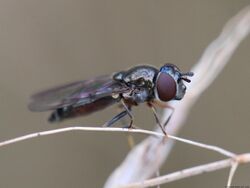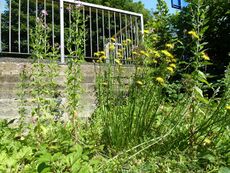Biology:Platycheirus ambiguus
| Platycheirus ambiguus | |
|---|---|

| |
| Scientific classification | |
| Kingdom: | |
| Phylum: | |
| Class: | |
| Order: | |
| Family: | |
| Genus: | |
| Subgenus: | Pachysphyria
|
| Species: | P. ambiguus
|
| Binomial name | |
| Platycheirus ambiguus (Fallén, 1817)
| |
| Synonyms | |
| |
Platycheirus ambiguus is a small widespread species of hoverfly found across the Palearctic from Ireland to Japan . A spring species found in flight in April and May, it visits spring-flowering trees and shrubs; e.g., Prunus spinosa in deciduous woodland and scrub.
The species is similar to several other small hoverflies and can be problematic to identify.
The larvae feed on aphids in various trees and shrubs.[1][2][3]
Description
External images
For terms, see: Morphology of Diptera.
Haltere knob is grey brown. Frons have heavy silver-grey dusting. Tergites are marked with yellow but heavily silver-grey dusted.
See references for determination.[4][5][6][7] [8]
Distribution
Palearctic: Fennoscandia south to Spain, Ireland east through Europe on to the Russian Far East and the Pacific coast, including Japan.[9][10][11]
Biology
Habitat: deciduous forest scrub, garrigue, hedgerows and gardens. Flies April to end of May. [12]
References
- ↑ Ball, Stuart; Morris, Roger (2013). Britain's Hoverflies: An Introduction to the Hoverflies of Britain. Woodstock, Oxfordshire: Princeton University Press. pp. 296pp. ISBN 978-0-691-15659-0.
- ↑ Ball, S.G.; Morris, R.K.A. (2000). Provisional atlas of British hoverflies (Diptera, Syrphidae). Monks Wood, UK: Biological Record Centre. 167 pages. ISBN 1-870393-54-6.
- ↑ Stubbs, Alan E.; Falk, Steven J (1983). British Hoverflies: An Illustrated Identification Guide (2nd ed.). London: British Entomological and Natural History Society. pp. 253, xvpp. ISBN 1-899935-03-7.
- ↑ Van Veen, M. (2004). Hoverflies of Northwest Europe: identification keys to the Syrphidae. 256pp. KNNV Publishing, Utrecht.addendum.
- ↑ Van der Goot, V.S. (1981). De zweefvliegen van Noordwest - Europa en Europees Rusland, in het bijzonder van de Benelux. KNNV, Uitgave no. 32: 275pp. Amsterdam.
- ↑ Bei-Bienko, G.Y. & Steyskal, G.C. (1988). Keys to the Insects of the European Part of the USSR, Volume V: Diptera and Siphonaptera, Part I. Amerind Publishing Co., New Delhi. ISBN:81-205-0080-6.
- ↑ Coe, R.L. (1953). "Diptera: Syrphidae". Handbks. Ident. Br. Insects 10(1): 1-98. R. Ent. Soc. London. pdf.
- ↑ Ohara, Kenji (1980). "he genus Platycheirus Lepeletier and Serville, 1818 (Diptera, Syrphidae) of Japan, with description of three new species.". Esakia 15: 97-142. https://catalog.lib.kyushu-u.ac.jp/opac_download_md/2405/97.pdf.
- ↑ Fauna Europaea.
- ↑ Peck, L.V. (1988). "Syrphidae". In: Soos, A. & Papp, L. (eds.) Catalogue of Palaearctic Diptera 8: 11-230. Akad. Kiado, Budapest.
- ↑ Vockeroth, J.R. (1992). The Flower Flies of the Subfamily Syrphinae of Canada, Alaska, and Greenland (Diptera: Syrphidae). Part 18. The Insects and Arachnids of Canada. Ottawa, Ontario: Canadian Government Pub Centre. pp. 1–456. ISBN 0-660-13830-1.
- ↑ Speight, M.C.D. (2011). "Species accounts of European Syrphidae (Diptera)". Syrph the Net, the database of European Syrphidae 65: 285pp. http://www.diptera.info/downloads/StN_Species_Accounts_Glasgow_2011.pdf.
Wikidata ☰ Q14428896 entry
 |


